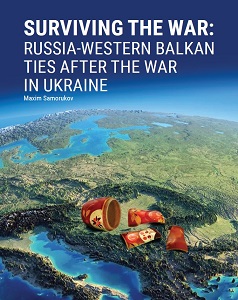SURVIVING THE WAR: RUSSIA-WESTERN BALKAN TIES AFTER THE WAR IN UKRAINE
SURVIVING THE WAR: RUSSIA-WESTERN BALKAN TIES AFTER THE WAR IN UKRAINE
Author(s): Maxim Samorukov
Subject(s): History, Special Historiographies:, Russian Aggression against Ukraine
Published by: BCBP Beogradski centar za bezbednosnu politiku
Summary/Abstract: Russia’s invasion of Ukraine in February 2022 pushed Europe into a new era of instability. The fundamentals of the continent’s political and economic order are shifting as Russia’s brutal methods of war undermine the prospects of the slightest cooperation between Moscow and European states. Decades-old trade links have been severed, transport corridors rerouted, and people to people contacts have become more scarce than ever. Europe is reshaping its security architecture around Russia as the main threat, while Moscow frames its aggression against Ukraine as an existential defensive war with a duplicitous West. The only European region that stands out in this process of growing mutual alienation is the Western Balkans. More than a year into the war, Russia’s relations with several Balkan states appear to have undergone little change. Serbia is eagerly continuing with energy deals with Gazprom, Bosnian Serb leaders frequent Moscow on official visits, and some leading Montenegrin parties are sticking to pro-Russian slogans. It would appear that time stands still in the Western Balkans, with petty local grievance sover riding major global developments. Yet the veneer of continuity conceals mounting challenges to the status quo that has served local elites so well for so long. Russia’s attack on Ukraine under the pretext of protecting the self-proclaimed Donbas republics alerted Europe to the reality that even a frozen conflict may quickly spiral out of control if manipulated by a hostile external power. This gave an extra impulse to the EU’s determination to put an end to the long standing disputes in the Balkans. New sticks and carrots are in use to push local leaders toward mutual accommodation. The EU has also become more assertive in insisting that European integration is incompatible with preserving close ties to Russia. In the Balkans, meanwhile, the war is diminishing the benefits of cooperation with Russia. With a vast part of its resources and international clout consumed by the aggression, Moscow can hardly remain as attractive a partner for the Balkan states as it was prior to 2022.Russia’s deepening economic rift with the EU countries is driving it out from the Balkan markets. Even the region’s traditional dependence on Russian hydrocarbons is on its last legs, and the reluctance of several Balkan states to join anti-Russian sanctions does little to change that. Moscow’s shocking brutality in Ukraine and flagrant denial of its own aggression have put an end to its role as a co-mediator in the settlement of the Balkan conflicts. Now, even pro-Russian forces in the region refrain from pleading for the Kremlin’s diplomatic assistance, striving instead to diversify their ties in favor of other international allies. The only sphere in which Russia-Balkan cooperation continues to thrive is propaganda. Moscow needs its Balkan allies in order to claim that its isolation in Europe is far from complete and that there are places where it is still welсomed as a partner. A number of Balkan politicians, for their part, have invested too much in cultivating and manipulating pro-Russian sentiment in the region to be able to wean themselves off this PR-dependency without sustaining any losses themselves. The propaganda cooperation is asymmetrical, with Moscow having little control over its Balkan partners and the ways they exploit Russia’s image to advance their own agenda. Nevertheless, the Kremlin appears to have no issue with that, viewing other options as too risky and costly. As a result, Russia is likely to retain a semblance of presence in the Western Balkans for years to come, even if it is confined to pronouncements in the local media. The PR interdependency between the Kremlin and Balkan leaders may prove too elusive to be curbed by sanctions or other formal commitments.
Series: Beogradski Centar za Bezbednosnu Politiku - POLICY PAPERS
- Page Count: 24
- Publication Year: 2023
- Language: English
- Content File-PDF
- Introduction

